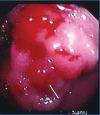PMS2 Pathogenic Variant in Lynch Syndrome-Associated Colorectal Cancer with Polyps
- PMID: 36644715
- PMCID: PMC9833889
- DOI: 10.1055/s-0042-1759888
PMS2 Pathogenic Variant in Lynch Syndrome-Associated Colorectal Cancer with Polyps
Abstract
Background Lynch syndrome (LS) is an autosomal dominant condition due to the germline mutation in the mismatch repair (MMR) genes including MLH1 , MSH2 , MSH6, and PMS2 (post-meiotic segregation increased 2). The MMR mutation carriers have high risk for cancers. Pathogenic PMS2 variants are rarely reported in LS-associated colorectal cancer (CRC) with colorectal polyps. The aim of the study was to investigate the genetic etiology of CRC in an individual with CRC with multiple colorectal polyps and a family history of cancers. Patients and Methods The index patient was an African male affected by CRC with multiple colorectal polyps. The clinical diagnostic for LS was based on the Amsterdam II criteria and pedigree. Next-generation sequencing with inherited cancer genes panel was used to detect the pathogenic variant. Results The patient fulfilled the Amsterdam II criteria and the pedigree revealed a family history of recurrent CRC. A deleterious PMS2 germline heterozygous mutation c.2192_2196delTAACT was detected. Conclusion Our study supports the notion that LS may be associated with polyps and shows the predisposition of PMS2 heterozygous mutation in LS-associated CRC at young age.
Keywords: PMS2 deficiency; colorectal cancer; lynch syndrome; mismatch repair gene.
The Author(s). This is an open access article published by Thieme under the terms of the Creative Commons Attribution License, permitting unrestricted use, distribution, and reproduction so long as the original work is properly cited. ( https://creativecommons.org/licenses/by/4.0/ ).
Conflict of interest statement
Conflict of Interest None declared.
Figures



References
LinkOut - more resources
Full Text Sources
Miscellaneous
